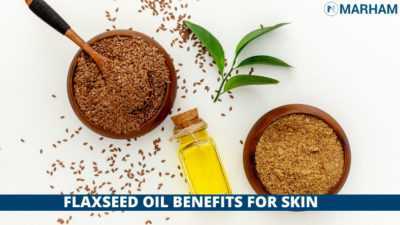Flaxseed oil is created from flax seeds that have been crushed and pressed. It has a long list of health benefits, including reducing inflammation, avoiding heart disease, and decreasing the risk of cancer. The evidence for these and other potential health advantages is discussed in the article, as well as negative effects to be aware of and precautions to consider when adding flaxseed oil to your diet. Here we will discuss about Flaxseed Oil benefits for skin. So let’s get started;
What Is Flaxseed Oil Used For?
Many active and beneficial substances are found in flaxseed oil, including:
- Omega-3 fatty acids
- Healthy proteins that may reduce heart disease risk factors
- Fiber to avoid digestive problems and constipation
- Phenolic chemicals (lignans) that may prevent cancer
- Minerals, such as calcium and magnesium


Talk to a nutritionist right now to discuss any problem. Omega 3 fatty acids have been shown to provide a slew of health benefits, particularly when it comes to heart health. These fatty acids are abundant in fish that are only ingested by non-vegetarians, such as mackerel, salmon, or sardines.
Flaxseeds are the greatest way for vegetarians to acquire a high dose of omega 3 fatty acids. Omega 3 fatty acids are responsible for almost all of flaxseed’s skin advantages. Here are some of flaxseed oil’s possible skin advantages, along with evidence to back them up. Here are ten of the best flaxseed uses for skin and hair.
A healthy body leads to a healthy complexion
Who you are is determined by what you eat. Flaxseeds are a high-nutrient food. Flax seeds’ anti-inflammatory characteristics aid in the reduction of symptoms associated with serious illnesses such as diabetes, arthritis, asthma, and even heart disease. The skin will feel healthy and supple only if the body is healthy on the inside.
Skin that glows
Omega 3 fatty acids can be found in abundance in flax seeds. These acids are beneficial to the heart and help to minimise the risk of heart disease. Flax seeds are the richest source of omega 3 fatty acids found in plants. These acids assist to keep the skin from becoming too dry.


Anti-Aging Ingredients
Flax seeds are high in lignans and antioxidants, which assist to prevent wrinkles and fine lines on the face. Flax seeds also contain fatty acids that keep the skin moisturised and smooth. Flax seeds have an innate property that helps to keep the skin taut and reduce sagging as we age.
Assists in the reduction of allergies
When boils or rashes occur, they are always unpleasant. Flaxseeds contribute to the health of the body’s cell membranes . The membranes let necessary nutrients circulate in the body while also preventing toxic elements that cause rashes from passing through. Flaxseeds are good for your skin if you eat them on a regular basis.
Acne-Prevention
Flaxseeds can help to balance estrogen. Flaxseeds have been demonstrated to help reduce acne breakouts in the body. Excess oil excretion on the face is another cause of acne. Sebum production is regulated by flaxseeds which prevent acne.


Possible Side Effects
Flaxseed oil is generally safe for most individuals when consumed in the proper doses and for a short period of time. Large amounts can cause diarrhoea and sluggish bowel movements. Allergic responses are possible as well. According to a 2010 study published in The American Journal of Clinical Nutrition, ALA may raise the risk of prostate cancer or encourage tumour growth.
According to another studies, ALA derived from animal-based meals heavy in saturated fats may be associated to prostate cancer. However, it’s possible that ALA isn’t to blame. Other ingredients in those foods, such as hormones and pesticides in meat, may contribute to tumour formation. However, much of this research is conjecture, and other research suggests flaxseed may be beneficial to men’s prostate health. Before adding flaxseed oil to their diet, anyone who is concerned about the effects of flaxseed oil on their prostate should consult their doctor.
Summary
Flaxseed oil, which is derived from ground flax seed, has been linked to reduced inflammation, weight loss, digestive health, heart health, and skin health. Although science backs up these claims, flaxseeds are not a magic solution for any ailment. Flaxseed oil has few negative effects when eaten in the proper dose, but there is little data on its safety when applied topically. Flaxseed oil can be used in juices, salads, and smoothies, as well as in body lotion and hair products. If you’re pregnant, breastfeeding, planning a surgery, or have a bleeding issue, you should talk to your doctor before using this supplement.
Consult the Best Nutritionists in Pakistan
Book an appointment now, to answer all your queries. You can book an appointment with the top nutritionists in Pakistan through Marham by calling at Marham helpline: 0311-1222398 or by online booking facility through the website or Marham mobile app.
Can’t Find The App?
| Android | IOS |
|---|---|
  |
  |
FAQ’s
Can we apply flaxseed oil on face?
Flaxseed oil contains important fatty acids that soften and smooth the appearance of your skin. You can use flaxseed oil alone or combine it with a light moisturizer and apply it evenly on your skin before going to bed.
Does flaxseed oil improve skin?
Flaxseed oil has been shown to improve skin health. In one modest trial, 13 women were given flaxseed oil to take for 12 weeks. They noticed increases in skin smoothness and hydration at the end of the research, as well as a reduction in skin sensitivity to irritation and roughness.
Can flaxseed remove dark spots?
Flaxseeds, which contain omega-3 fatty acids, can protect the skin from the sun’s UV rays and aid in the removal of dry spots. We become aware of our skin when it comes to it. Furthermore, blemishes, black patches, uneven skin tone, and dead skin cells on our faces are things we don’t like to see.

